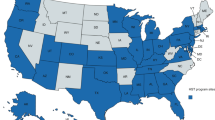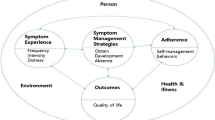Summary:
This is a pilot study comparing the emotional distress of patients receiving an intensified conditioning regimen (radioimmunotherapy=RIT) with patients receiving conventional conditioning for allogeneic stem cell transplantation. In total, 53 patients (18 received RIT) were given two questionnaires designed to measure emotional distress (HADS, POMS) before starting conditioning (t1) and at discharge (t2). During the in-patient period, patients answered questions daily relating to physical distress, psychological distress, and how they were ‘coping with the situation’. At t2, the transplant team assessed the manner in which the patients were coping. The data displayed no relevant differences with regard to emotional distress between the two groups, both at t1 and t2. For both groups, anxiety and vigor decreased and fatigue increased between t1 and t2. On average, perceived distress was higher for those patients being treated with RIT during the in-patient time, but the differences between both groups were significant only regarding physical distress during the recovery period. No difference was found for the transplant team's assessment. We hypothesize that an intensified conditioning regimen with RIT per se has only a small distressing effect on the patients’ psyche during their stay at the hospital. Differences between both groups probably result from independent factors such as, for example, the patients’ pre-existing health conditions.
This is a preview of subscription content, access via your institution
Access options
Subscribe to this journal
Receive 12 print issues and online access
$259.00 per year
only $21.58 per issue
Buy this article
- Purchase on Springer Link
- Instant access to full article PDF
Prices may be subject to local taxes which are calculated during checkout

Similar content being viewed by others
References
Lesko LM . Bone marrow transplantation. In: Holland JC, Rowland JH (eds). Handbook of Psychooncology – Psychological Care of the Patient with Cancer. Oxford University Press: New York, Oxford, 1989, pp 163–173.
Santos GW . Historical background. In: Atkinson K (ed.). Clinical Bone Marrow Transplantation: A Reference Textbook. University Press: Cambridge, 1994, pp 1–9.
Reske SN, Bunjes D, Buchmann I et al. Targeted bone marrow irradiation in the conditioning of high-risk leukaemia prior to stem cell transplantation. Eur J Nucl Med 2001; 28: 807–815.
Clift RA, Buckner CD, Appelbaum FR et al. Allogeneic marrow transplantation in patients with chronic myeloid leukemia in the chronic phase: a randomized trial of two irradiation regimens. Blood 1991; 77: 1660–1665.
Clift RA, Buckner CD, Appelbaum FR et al. Allogeneic marrow transplantation in patients with acute myeloid leukemia in first remission: a randomized trial of two irradiation regimens. Blood 1990; 76: 1867–1871.
Gaston-Johansson F, Franco T, Zimmerman L . Pain and psychological distress in patients undergoing autologous bone marrow transplantation. Oncol Nurs Forum 1992; 19: 41–48.
Larsen J, Nordström G, Björkstrand B et al. Symptom distress, functional status and health-related quality of life before high-dose chemotherapy with stem-cell transplantation. Eur J Cancer Care 2003; 12: 71–80.
Molassiotis A, van den Akker OBA, Milligan DW et al. Psychological adaptation and symptom distress in bone marrow transplant recipients. Psychooncology 1996; 5: 9–22.
Mytko JJ, Knight SJ, Chastain D et al. Coping strategies and psychological distress in cancer patients before autologous bone marrow transplant. J Clin Psychol Med Settings 1996; 3: 355–366.
Schulz-Kindermann F, Hennings U, Ramm G et al. The role of biomedical and psychosocial factors for the prediction of pain and distress in patients undergoing high-dose therapy and BMT/PBSCT. Bone Marrow Transplant 2002; 29: 341–351.
Herrmann C, Buss U, Snaith RP . HADS-D Hospital Anxiety and Depression Scale – Deutsche Version. Huber: Bern, 1995.
McNair DM, Lorr M, Doppleman LF . POMS Profile of Mood States. Ein Verfahren zur Messung von Stimmungszuständen. In: Collegium Internationale Psychiatriae Scalarum (CIPS) (ed.). Internationale Skalen für Psychiatrie. Beltz Test Gesellschaft: Weinheim, 1981.
SPSS Inc. SPSS for Windows (Rel. 11.0.1., 15 Nov 2001). SPSS Inc.: Chicago, IL, 2001.
Acknowledgements
This study was supported by the German José Carreras Leukemia-Foundation (grant # DJCLS-R01/11f).
Author information
Authors and Affiliations
Corresponding author
Rights and permissions
About this article
Cite this article
Grulke, N., Bailer, H., Kächele, H. et al. Psychological distress of patients undergoing intensified conditioning with radioimmunotherapy prior to allogeneic stem cell transplantation. Bone Marrow Transplant 35, 1107–1111 (2005). https://doi.org/10.1038/sj.bmt.1704971
Received:
Accepted:
Published:
Issue Date:
DOI: https://doi.org/10.1038/sj.bmt.1704971
Keywords
This article is cited by
-
The added value of auditory cortex transcranial random noise stimulation (tRNS) after bifrontal transcranial direct current stimulation (tDCS) for tinnitus
Journal of Neural Transmission (2017)
-
Advance care planning among hematopoietic cell transplant patients and bereaved caregivers
Bone Marrow Transplantation (2014)
-
Comparison of early quality of life outcomes in autologous and allogeneic transplant patients
Bone Marrow Transplantation (2012)
-
Predictors of health-related quality of life in patients treated with auto- and allo-SCT for hematological malignancies
Bone Marrow Transplantation (2012)
-
Functional status and health-related quality of life among allogeneic transplant patients at hospital discharge: a comparison of sociodemographic, disease, and treatment characteristics
Supportive Care in Cancer (2012)



